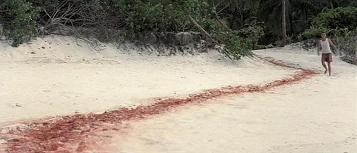

 |
 |
| Photo © 2000 20th Century Fox/Figment Films |
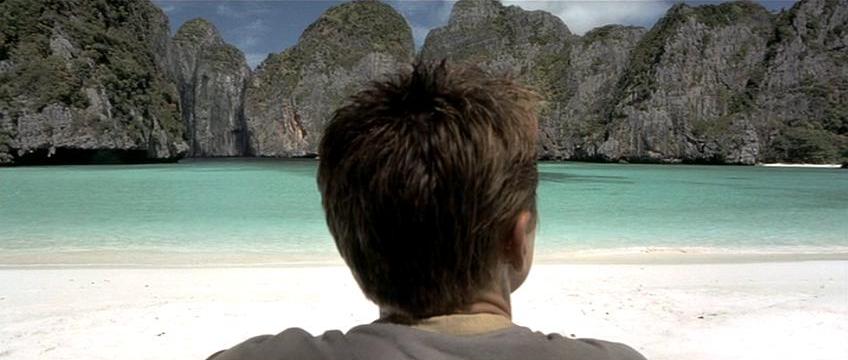 To me, the problem with the very exciting and pulpy book that I had hoped the movie would solve was that the inherent appeal of "pure virgin beach in
Thailand!" seems so inherently limited and temporary that it doesn't work well as a pin to hang any conflict on. It makes for some lovely establishing
shots, and Darius gets to amp up the film's colors to the kind of jewel tones that his other work rarely allowed. But the suspense and toil of actually
finding this rumored beach—which Boyle rushes a bit—have a tension that the beach itself can't possibly have, and once things start going sour, it
doesn't make sense why anyone would stay. Certainly the movie doesn't make the human community itself enough of a "pull" to keep anyone in place, but nor
is he willing to villainize them enough so that Richard's realization that they aren't allowed to leave could have as much charge as I remember it
carrying in the novel.
To me, the problem with the very exciting and pulpy book that I had hoped the movie would solve was that the inherent appeal of "pure virgin beach in
Thailand!" seems so inherently limited and temporary that it doesn't work well as a pin to hang any conflict on. It makes for some lovely establishing
shots, and Darius gets to amp up the film's colors to the kind of jewel tones that his other work rarely allowed. But the suspense and toil of actually
finding this rumored beach—which Boyle rushes a bit—have a tension that the beach itself can't possibly have, and once things start going sour, it
doesn't make sense why anyone would stay. Certainly the movie doesn't make the human community itself enough of a "pull" to keep anyone in place, but nor
is he willing to villainize them enough so that Richard's realization that they aren't allowed to leave could have as much charge as I remember it
carrying in the novel.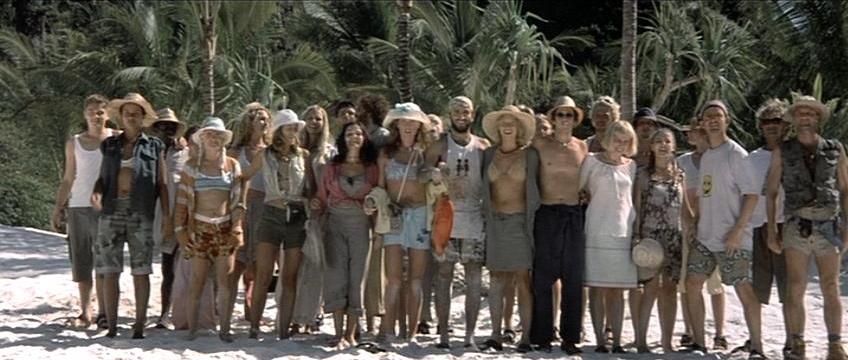 Especially this time around, I have serious problems with the whole beach community—basically, I loathe all of them on sight, which I'm pretty sure the
movie doesn't want me to, and there's surprisingly little variation in the basic stereotyping of the Swedish fisher dudes, the cricket-playing (Telegraph-reading!)
British dude, and whatnot. Like you say, the movie's real challenge is to get its conflict stewing here, and I think this larky approach, which keeps
seeming to introduce characters we've already met by recapitulating their headline attributes, makes virtually no attempt to address this. By the time
Richard is running around in the jungle like Martin Sheen meets Rambo, Boyle has inelegantly retreated into his default final-act mode of Trippy Psycho
Overkill—cf. Eccleston in Shallow Grave, Renton vs. Begbie in Trainspotting, Murphy's bloody woodland spree in 28
Days Later, the Sun-God killer/whatever in Sunshine (Tim's review).
It's not enough. I like the hints of Richard's moral alienation
right at the start, particularly the way he closes the door behind him while regarding Daffy's corpse (though that's another good scene half-ruined by
"this-was-some-crazy-shit!" voiceover). But this idea isn't followed through properly in the paradise sequences, and Leo, who is very uneven, can't do much
to make Richard's bandanna psychosis actually work as a dramatic device. Still, I do appreciate the way his lie about copying the map comes back to haunt
him—the way reducing it to a half-lie ("I only showed it to them!") actually makes the situation worse, the way Tilda turns on him, the dumb obliviousness
of the new visitors, which sends a chill. That thread of the plot works, I think, because it's well-observed that a hungrily self-interested personality
type such as Richard's would squirm out of lies by admitting only as much as he has to. And his terror of exposure, or basically unpopularity in the camp,
is pretty real to me: if only we believed in the community a bit more, we might care more.
Especially this time around, I have serious problems with the whole beach community—basically, I loathe all of them on sight, which I'm pretty sure the
movie doesn't want me to, and there's surprisingly little variation in the basic stereotyping of the Swedish fisher dudes, the cricket-playing (Telegraph-reading!)
British dude, and whatnot. Like you say, the movie's real challenge is to get its conflict stewing here, and I think this larky approach, which keeps
seeming to introduce characters we've already met by recapitulating their headline attributes, makes virtually no attempt to address this. By the time
Richard is running around in the jungle like Martin Sheen meets Rambo, Boyle has inelegantly retreated into his default final-act mode of Trippy Psycho
Overkill—cf. Eccleston in Shallow Grave, Renton vs. Begbie in Trainspotting, Murphy's bloody woodland spree in 28
Days Later, the Sun-God killer/whatever in Sunshine (Tim's review).
It's not enough. I like the hints of Richard's moral alienation
right at the start, particularly the way he closes the door behind him while regarding Daffy's corpse (though that's another good scene half-ruined by
"this-was-some-crazy-shit!" voiceover). But this idea isn't followed through properly in the paradise sequences, and Leo, who is very uneven, can't do much
to make Richard's bandanna psychosis actually work as a dramatic device. Still, I do appreciate the way his lie about copying the map comes back to haunt
him—the way reducing it to a half-lie ("I only showed it to them!") actually makes the situation worse, the way Tilda turns on him, the dumb obliviousness
of the new visitors, which sends a chill. That thread of the plot works, I think, because it's well-observed that a hungrily self-interested personality
type such as Richard's would squirm out of lies by admitting only as much as he has to. And his terror of exposure, or basically unpopularity in the camp,
is pretty real to me: if only we believed in the community a bit more, we might care more.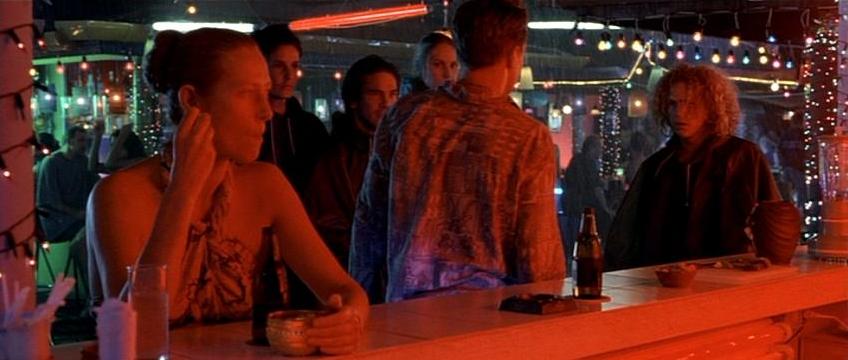 But for all we're complaining about the film's lack of tension, I'm wondering if we need to generate some? I do like how the script's general over-playing
of self-consciousness results in some nice piss-taking moments, as when Ledoyen shuts down Leo's ridiculous come-on about taking pictures of the stars, and
though it tips the hat a bit too much, I do love Leo's initial appraisal of the group: "There wasn't any ideology or shit like that; it was just a beach
resort." The trip back to Koh Pah Ngan is suitably bleak and disheartening, and I love that Tilda plays the whole episode as the bored camp counselor,
forced to drive the sedan back into town for some batteries. By contrast, the refusal to haul in a dentist prompts some effective alarms, and I loved that the
negotiations over whether to bring Christo a doctor after he's mauled by a shark played out in one unbroken shot, monitoring everyone's varying degrees of
testiness (though sadly, on the commentary track, Boyle actually apologizes for this shot, admitting they'd run out of money and time and he didn't have
the luxury of going in for close-ups). There are enough scenes and images and little accents that work to keep the whole vehicle moving, despite its
repeated compromises and misjudgments.
But for all we're complaining about the film's lack of tension, I'm wondering if we need to generate some? I do like how the script's general over-playing
of self-consciousness results in some nice piss-taking moments, as when Ledoyen shuts down Leo's ridiculous come-on about taking pictures of the stars, and
though it tips the hat a bit too much, I do love Leo's initial appraisal of the group: "There wasn't any ideology or shit like that; it was just a beach
resort." The trip back to Koh Pah Ngan is suitably bleak and disheartening, and I love that Tilda plays the whole episode as the bored camp counselor,
forced to drive the sedan back into town for some batteries. By contrast, the refusal to haul in a dentist prompts some effective alarms, and I loved that the
negotiations over whether to bring Christo a doctor after he's mauled by a shark played out in one unbroken shot, monitoring everyone's varying degrees of
testiness (though sadly, on the commentary track, Boyle actually apologizes for this shot, admitting they'd run out of money and time and he didn't have
the luxury of going in for close-ups). There are enough scenes and images and little accents that work to keep the whole vehicle moving, despite its
repeated compromises and misjudgments.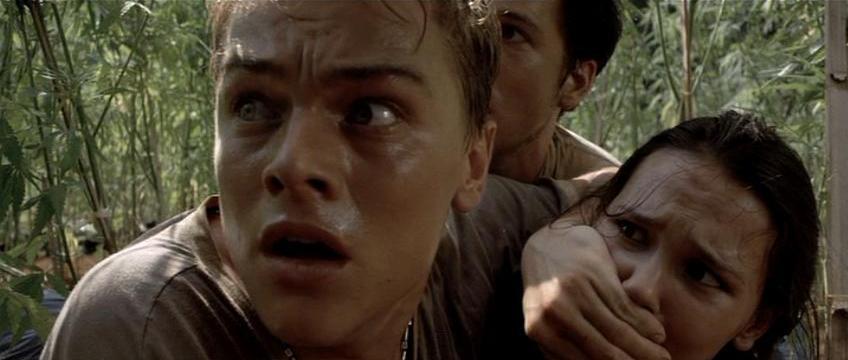 TR: Sorry, buddy, but in the throwing-down-the-gauntlet stakes, your contention that Leonardo DiCaprio is a lazy, overrated
actor is not one especially likely to have me coming at you with fists clenched. I think I might like him a bit more than you in The
Aviator, but otherwise we're stuck on the same page again, and having just yawned my way through the impressively redundant Body of Lies,
I've got to say my demand for pugilistic sarcasm and pissy, goateed impatience is way beyond satiated for the time being. If I'll say anything for him in
The Beach, it's that he's often most interesting when he's afraid, and Boyle does push him in the movie's most extreme moments into a kind of
snarling animal terror that takes you briefly aback (and back to his Gilbert Grape hissy fits); still, for 90% of the time he's falling back on all
the usual wise-ass mannerisms, and seems to share the script's timid uncertainty about exactly how self-absorbed Richard is meant to be.
TR: Sorry, buddy, but in the throwing-down-the-gauntlet stakes, your contention that Leonardo DiCaprio is a lazy, overrated
actor is not one especially likely to have me coming at you with fists clenched. I think I might like him a bit more than you in The
Aviator, but otherwise we're stuck on the same page again, and having just yawned my way through the impressively redundant Body of Lies,
I've got to say my demand for pugilistic sarcasm and pissy, goateed impatience is way beyond satiated for the time being. If I'll say anything for him in
The Beach, it's that he's often most interesting when he's afraid, and Boyle does push him in the movie's most extreme moments into a kind of
snarling animal terror that takes you briefly aback (and back to his Gilbert Grape hissy fits); still, for 90% of the time he's falling back on all
the usual wise-ass mannerisms, and seems to share the script's timid uncertainty about exactly how self-absorbed Richard is meant to be. I agree exactly that The Beach seems like a misfire that should have been better and subtly seems to know it, unlike a Slumdog that looks
exactly like what you presume its makers wanted, however much that horrifies me. The fractiousness that followed the production, with all the tiffing
about whether or not the filmmaking team had actually despoiled their locations, is more vibrant in my memory than whether the actual period of shooting
was troubled, though I'm sure they cut a lot out. I only listened to part of the commentary track; doubtless Boyle's got more stories to tell. And Leo
has often pointed to this film as a major pivot in his Green awakening, right, so something impressive and important did come out of this bungled but
certainly watchable yarn. Even some of the botches are fun: the director who decides to construct a fleeting video game out of a paranoid jungle rampage
is clearly the guy who bounces like Tigger when he wins an Oscar. Even if I can't help laughing at the Reefer Madness logic by which pot makes you
hyperactive, crazed, and murderous. This kind of formal giddiness compels enough fondness when it's buzzing, for better or worse, that I suppose a C,
if a mite generous, isn't totally out of the question.
I agree exactly that The Beach seems like a misfire that should have been better and subtly seems to know it, unlike a Slumdog that looks
exactly like what you presume its makers wanted, however much that horrifies me. The fractiousness that followed the production, with all the tiffing
about whether or not the filmmaking team had actually despoiled their locations, is more vibrant in my memory than whether the actual period of shooting
was troubled, though I'm sure they cut a lot out. I only listened to part of the commentary track; doubtless Boyle's got more stories to tell. And Leo
has often pointed to this film as a major pivot in his Green awakening, right, so something impressive and important did come out of this bungled but
certainly watchable yarn. Even some of the botches are fun: the director who decides to construct a fleeting video game out of a paranoid jungle rampage
is clearly the guy who bounces like Tigger when he wins an Oscar. Even if I can't help laughing at the Reefer Madness logic by which pot makes you
hyperactive, crazed, and murderous. This kind of formal giddiness compels enough fondness when it's buzzing, for better or worse, that I suppose a C,
if a mite generous, isn't totally out of the question.| Permalink | Home | 2000 | ABC | Blog |